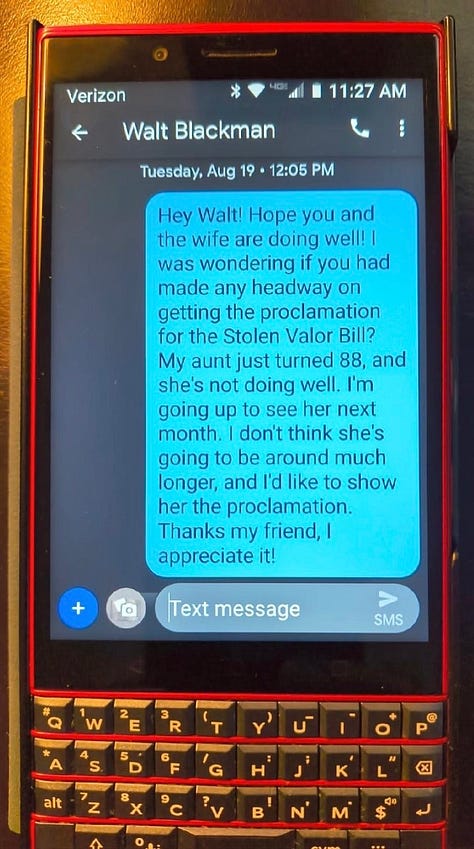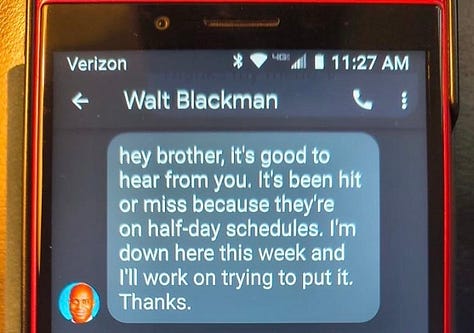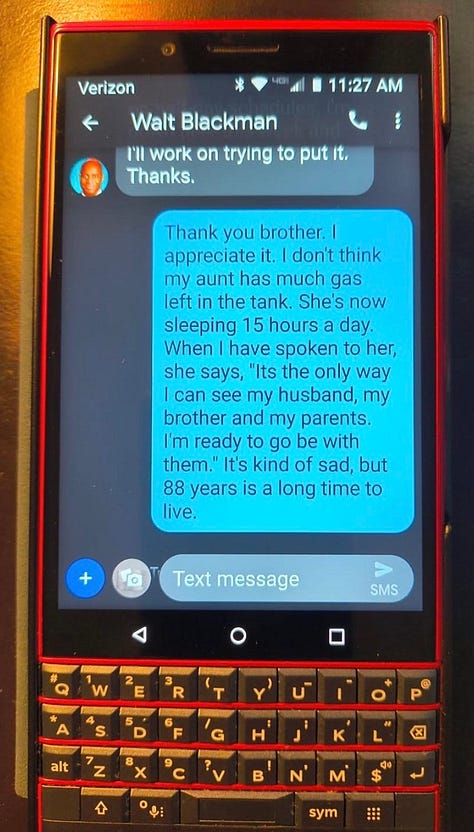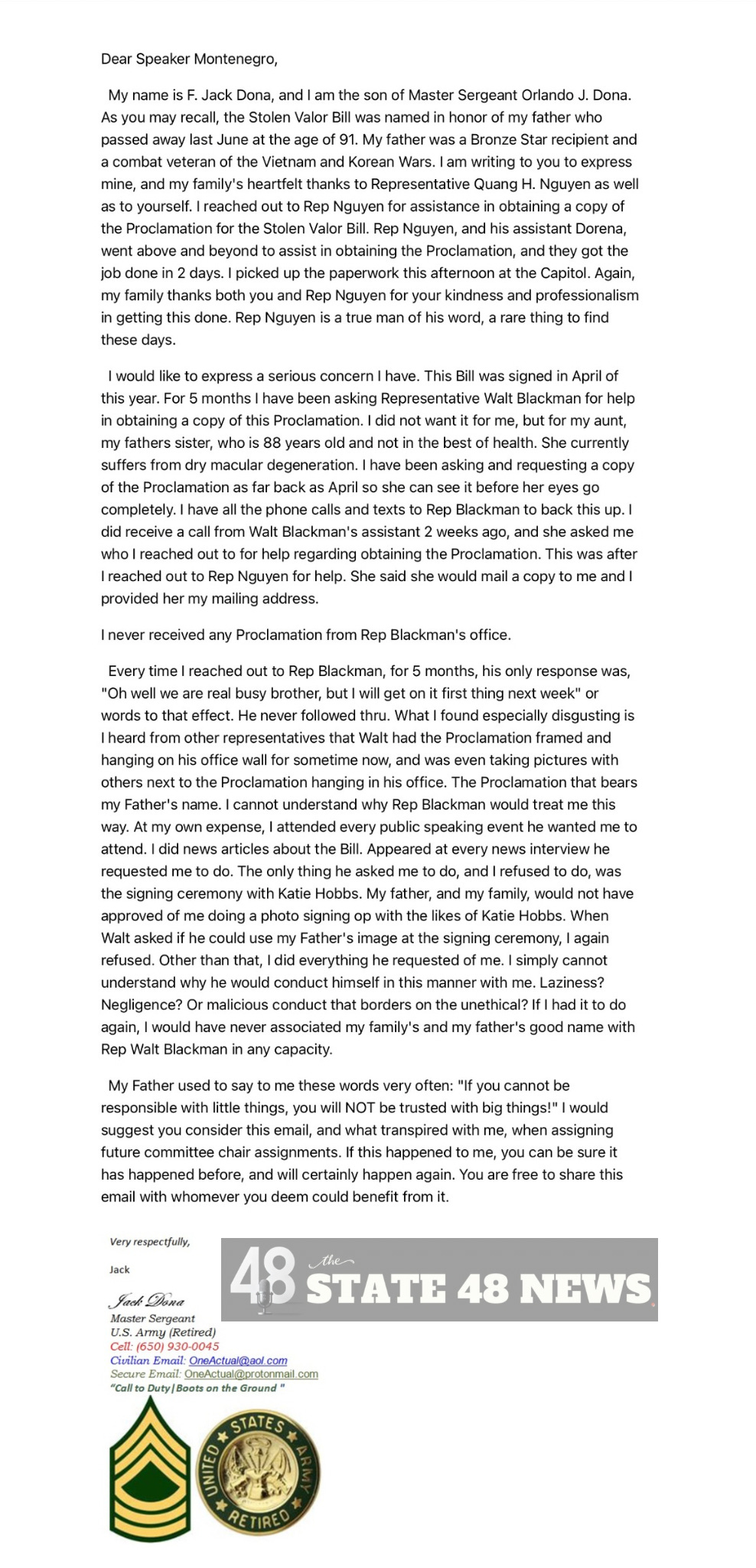The Master Sergeant Orlando Dona Valor Act, better known as Arizona’s Stolen Valor Bill, was one of the flagship pieces of legislation from the last session. If you were in Arizona, you saw the headlines. The bipartisan measure cracked down on impersonating veterans for personal or financial gain, and it carried a powerful name: Master Sergeant Orlando Dona, a U.S. Air Force veteran who passed away in June 2024 at age 91.
As journalist Rachel Alexander reported on January 14, 2025, the bill was introduced by Rep. Walt Blackman (R-Snowflake) and named in honor of Dona’s late father.
His son, Jack Dona, a retired U.S. Army Master Sergeant and founder of The CONELRAD Group, told Alexander, “It is a great honor to our family to have the Arizona Legislature name this bill in honor of my father. On April 17, 1949, at the age of 16, Dad immigrated to the United States from the Panama Canal Zone. From the moment he disembarked at the port of San Francisco, he embraced this nation with all his heart and dedicated his life to serving his country — first in the military, and later in academics as a computer engineer for university systems. From the moment he set foot on U.S. soil, Dad was 100 percent an American at heart,” Alexander reported.
Photo Credit: The Arizona Sun Times — The late Orlando Jose Dona, MSgt, United States Air Force (Retired), pictured with his son Jack Dona, MSG, U.S. Army (Retired), on the right.
That moment of pride has since turned bittersweet according to an exclusive interview given to State 48 News.
The legislative fight to crack down on military impersonation in Arizona ended in a bipartisan victory last spring. But according to Dona, one of the bill’s most visible advocates, the aftermath of that victory revealed a personal and painful divide.
Retired U.S. Army Master Sgt. Jack Dona, whose late father is the namesake of Arizona’s newly enacted Stolen Valor measure, says the bill’s sponsor, Rep. Walt Blackman, failed to provide him a copy of the ceremonial proclamation despite months of requests. Dona says he needed the document for his 88-year-old aunt, whose eyesight is failing and who was eager to read the state’s formal recognition of her brother.
“I wasn’t asking for myself,” Dona said in an interview with State 48 News. “I wanted to take it to my aunt before she lost more of her vision.”
Dona says he assisted Blackman and his staff earlier this year in drafting portions of the legislation and the accompanying proclamation, specifically the section referencing “special tabs and decorations,” which he adapted from Army Regulation 670-1 to correct an omission.
Photo Credit: January 15, 2025 — Press conference at the Arizona State Capitol featuring Rep. Walt Blackman, various legislators, community members, and retired Master Sergeant Jack Dona speaking. Photo by Christy Kelly.
The bill passed in April 2025. Dona, who lives in Sierra Vista about three and a half hours from the Capitol, frequently appeared at press conferences and media events during the push.
State 48 News often saw Dona at the Capitol, holding press conferences, sitting in committee hearings, joining live social media discussions, and making tireless posts to keep the bill alive.
After passage, Dona says he declined to participate in a public bill-signing and did not authorize use of his late father’s image for that ceremony, citing personal and political reasons. He told State 48 News he did not want to appear publicly with Governor Katie Hobbs. Blackman, he said, wanted him there and asked to use his father’s image, which Dona declined.
Even so, he says he continued to ask Blackman by phone, text, and email for a copy of the signed proclamation through August.



When no document arrived, Dona reached out in September to Rep. Quang Nguyen (R-LD1), who had supported the bill, and explained that he planned to visit his aunt in Nevada within days. Nguyen contacted Speaker Steve Montenegro (R-LD25), according to Dona.
The last contact Dona had with Blackman came when the legislator’s assistant called to ask for his mailing address and said a copy of the proclamation would be sent. According to Dona, it never arrived. During that call, the assistant also asked who he had spoken with about not receiving the document.
Nguyen then informed Dona that, at Montenegro’s direction, he would reproduce and sign an official copy so Dona could hand-deliver it. Dona and his wife drove to Phoenix to retrieve the proclamation and then went to Nevada, where he read it aloud to his aunt.
“She held it and said she wanted it on her bed so she could read it that night with her magnifier and again in the morning,” Dona said. “She was so proud.”
Dona says the proclamation he obtained bears Nguyen’s signature rather than Blackman’s, which he finds unusual given custom and the sponsor’s role. He also alleges that during the months he was asking for a copy, he was told that Blackman displayed one on his office wall and took photos with it, a claim State 48 News has not independently verified.
“All he had to do was take it off the wall, scan it, and email it,” Dona said. “Instead, it was week after week, month after month.”
In his letter to Speaker Montenegro, Dona wrote that the experience felt “cruel” and cited his father’s saying: “If you cannot be responsible with little things, you will not be trusted with big things later in life.” He emphasized that he never sought compensation for his work on the bill and that his only goal was to honor his father and bring comfort to his aunt.
Dona credits Nguyen and Montenegro for making sure he had a document in hand before his trip. “Representative Nguyen and the Speaker came through,” he said. “I’m grateful for that.”
As of October 28, 2025, Dona says he has received no further communication from Blackman and still does not have a proclamation signed by the bill’s sponsor.
Ceremonial proclamations often accompany high-profile legislation, especially measures named in honor of individuals. While proclamations are not legally binding, families and advocates often treat them as keepsakes marking the public significance of their efforts.
Dona says the timing of this one was critical because of his aunt’s declining eyesight and recent personal losses. “This was one of the last things that could truly connect her to my dad’s service and sacrifice,” he said. Dona told State 48 News that his Aunt and father were extremely close and would speak daily by phone.
State 48 News has asked Rep. Blackman for comment on Dona’s account and on the customary practice for signing proclamations associated with sponsored bills. Any response will be included in an update to this story.














